Music history - Study guides, Study notes & Summaries
Looking for the best study guides, study notes and summaries about Music history? On this page you'll find 5180 study documents about Music history.
All 5.180 results
Sort by
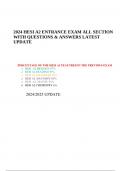 Popular
Popular
-
2024 HESI A2 ENTRANCE EXAM ALL SECTION WITH QUESTIONS & ANSWERS LATEST UPDATE.
- Exam (elaborations) • 356 pages • 2024
-
- R465,72
- 15x sold
- + learn more
2024 HESI A2 ENTRANCE EXAM ALL SECTION WITH QUESTIONS & ANSWERS LATEST UPDATE. PERCENTAGE OF THE HESI A2 FEATURED IN THE PREVIOUS EXAM HESI A2 BIOLOGY 87% HESI A2 READING 95% HESI A2 GRAMMAR 88% HESI A2 ANATOMY 85% HESI A2 MATHS 92% HESI A2 CHEMISTRY 85% 2024/2025 UPDATE 2024 HESI A2 ENTRANCE EXAM ALL SECTION WITH QUESTIONS & ANSWERS LATEST UPDATE ● Isaac Asimov ● Laughter ● Jazz ● Homonyms ● Glass ● Changing time ● Mr. Rogers ● Lightning strikes ● Hea...
![AQA A-level HISTORY 7042/2S Component 2S The Making of Modern Britain, 1951– 2007 Version: 1.0 Final IB/M/Jun23/E5 7042/2S A-level HISTORYQUESTION PAPER & MARKING SCHEME/ [MERGED] Mark scheme June 2023](/docpics/4383794/65ba625c05672_4383794_121_171.jpeg) Popular
Popular
-
AQA A-level HISTORY 7042/2S Component 2S The Making of Modern Britain, 1951– 2007 Version: 1.0 Final IB/M/Jun23/E5 7042/2S A-level HISTORYQUESTION PAPER & MARKING SCHEME/ [MERGED] Mark scheme June 2023
- Exam (elaborations) • 17 pages • 2024 Popular
- Available in package deal
-
- R148,90
- 9x sold
- + learn more
AQA A-level HISTORY 7042/2S Component 2S The Making of Modern Britain, 1951– 2007 Version: 1.0 Final IB/M/Jun23/E5 7042/2S A-level HISTORY Component 2S The Making of Modern Britain, 1951–2007 Friday 9 June 2023 Afternoon Time allowed: 2 hours 30 minutes Materials For this paper you must have: • an AQA 16-page answer book. Instructions • Use black ink or black ball-point pen. • Write the information required on the front of your answer book. The Paper Reference is 704...
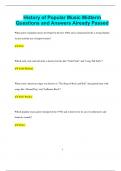
-
History of Popular Music Midterm Questions and Answers Already Passed
- Exam (elaborations) • 36 pages • 2024
- Available in package deal
-
- R204,81
- 1x sold
- + learn more
History of Popular Music Midterm Questions and Answers Already Passed What genre of popular music developed in the late 1940s and is characterized by a strong rhythm section and the use of improvisation? Jazz. Which early rock and roll artist is known for hits like "Tutti Frutti" and "Long Tall Sally"? Little Richard. What iconic American singer was known as "The King of Rock and Roll" and gained fame with songs like "Hound Dog" and "Jailhouse Rock"?...
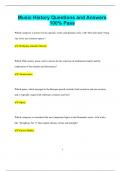
-
Music History Questions and Answers 100% Pass
- Exam (elaborations) • 15 pages • 2024
- Available in package deal
-
- R186,18
- + learn more
Music History Questions and Answers 100% Pass Which composer is known for his operatic works and dramatic style, with "Don Giovanni" being one of his most famous operas? Wolfgang Amadeus Mozart. Which 20th-century music style is known for the rejection of traditional tonality and the exploration of free rhythm and dissonance? Atonal music. Which genre, which emerged in the Baroque period, includes both recitative and aria sections and is typically staged with elaborate c...
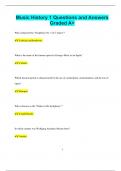
-
Music History 1 Questions and Answers Graded A+
- Exam (elaborations) • 20 pages • 2024
- Available in package deal
-
- R186,18
- + learn more
Music History 1 Questions and Answers Graded A+ Who composed the "Symphony No. 5 in C minor"? Ludwig van Beethoven. What is the name of the famous opera by Georges Bizet set in Spain? Carmen. Which musical period is characterized by the use of counterpoint, ornamentation, and the rise of opera? Baroque. Who is known as the "Father of the Symphony"? Joseph Haydn. In which country was Wolfgang Amadeus Mozart born? Austria. 2 What is the title of the f...
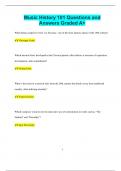
-
Music History 101 Questions and Answers Graded A+
- Exam (elaborations) • 21 pages • 2024
- Available in package deal
-
- R186,18
- + learn more
Music History 101 Questions and Answers Graded A+ What Italian composer wrote "La Traviata," one of the most famous operas of the 19th century? Giuseppe Verdi. Which musical form, developed in the Classical period, often follows a structure of exposition, development, and recapitulation? Sonata form. What is the term for a musical style from the 20th century that breaks away from traditional tonality, often utilizing atonality? Expressionism. Which composer is known ...
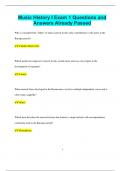
-
Music History I Exam 1 Questions and Answers Already Passed
- Exam (elaborations) • 37 pages • 2024
- Available in package deal
-
- R204,81
- + learn more
Music History I Exam 1 Questions and Answers Already Passed Who is considered the "father" of opera, known for his early contributions to the genre in the Baroque period? Claudio Monteverdi. Which medieval composer is known for his sacred music and was a key figure in the development of organum? Léonin. What musical form, developed in the Renaissance, involves multiple independent voices and is often sung a cappella? Motet. Which term describes the musical texture ...
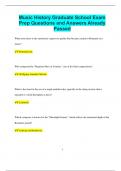
-
Music History Graduate School Exam Prep Questions and Answers Already Passed
- Exam (elaborations) • 83 pages • 2024
- Available in package deal
-
- R223,45
- + learn more
Music History Graduate School Exam Prep Questions and Answers Already Passed What term refers to the emotional, expressive quality that became central in Romantic-era music? Romanticism. Who composed the "Requiem Mass in D minor," one of his final compositions? Wolfgang Amadeus Mozart. What is the term for the use of a single melodic idea, typically in the string section, that is repeated or varied throughout a piece? Leitmotif. Which composer is known for the ...
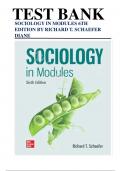
-
Test Bank For Sociology in Modules 6th Edition by Richard T. Schaefer, All Chapters, Complete Guide A+
- Exam (elaborations) • 1551 pages • 2024
-
- R335,26
- 4x sold
- + learn more
Sociology in Modules 6 th ed by Schaefer Test Bank Sociology in Modules, (Schaefer) Chapter 01 Understanding Sociology 1) The awareness that allows people to comprehend the link between their immediate, personal social settings and the remote, impersonal social world is called A) the sociological imagination. B) anthropology. C) a theory. D) verstehen. 2) Trying to understand why your roommate prefers a certain genre of music, over others, is an example of using one's A) cultural capital. B) co...
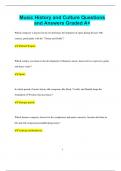
-
Music History and Culture Questions and Answers Graded A+
- Exam (elaborations) • 15 pages • 2024
- Available in package deal
-
- R186,18
- + learn more
Music History and Culture Questions and Answers Graded A+ Which composer is known for his revolutionary development of opera during the late 19th century, particularly with his "Tristan und Isolde"? Richard Wagner. Which country was home to the development of flamenco music, known for its expressive guitar and dance styles? Spain. In which period of music history did composers like Bach, Vivaldi, and Handel shape the foundation of Western classical music? Baroque per...
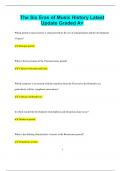
-
The Six Eras of Music History Latest Update Graded A+
- Exam (elaborations) • 12 pages • 2024
-
- R186,18
- + learn more
The Six Eras of Music History Latest Update Graded A+ Which period in music history is characterized by the use of ornamentation and the development of opera? Baroque period. What is the key feature of the Classical music period? Clarity of structure and form. Which composer is associated with the transition from the Classical to the Romantic era, particularly with his symphonic innovations? Ludwig van Beethoven. In which era did the development of polyphony and Gregorian ...

How did he do that? By selling his study notes on Stuvia. Try it yourself! Discover all about earning on Stuvia


